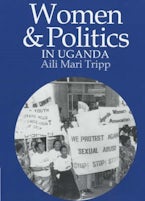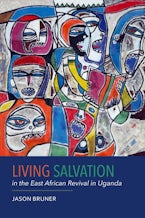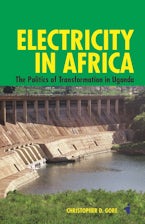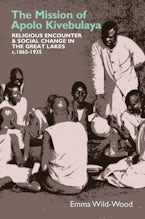
Title Details
416 Pages
23.4 x 15.6 cm
8 b/w illus.
Series: Eastern Africa Series
Series Vol. Number:
56
Imprint: James Currey
Decolonising State & Society in Uganda
The Politics of Knowledge & Public Life
- Description
- Contents
- Author
Key book on the debates surrounding the knowledge economy and decolonialization of African Studies, that brings the subject up to date for the 21st century.
Decolonization of knowledge has become a major issue in African Studies in recent years, brought to the fore by social movements such as #RhodesMustFall and #BlackLivesMatter. This timely book explores the politics and disputed character of knowledge production in colonial and postcolonial Uganda, where efforts to generate forms of knowledge and solidarity that transcend colonial epistemologies draw on long histories of resistance and refusal. Bringing together scholars from Africa, Europe and North America, the contributors in this volume analyse how knowledge has been created, mobilized, and contested across a wide range of Ugandan contexts. In so doing, they reveal how Ugandans have built, disputed, and reimagined institutions of authority and knowledge production in ways that disrupt the colonial frames that continue to shape scholarly analyses and state structures. From the politics of language and gender in Bakiga naming practices to ways of knowing among the Acholi, the hampering of critical scholarship by militarism and authoritarianism, and debates over the names of streets, lakes, mountains, and other public spaces, this book shows how scholars and a wide range of Ugandan activists are reimagining the politics of knowledge in Ugandan public life.
Decolonization of knowledge has become a major issue in African Studies in recent years, brought to the fore by social movements such as #RhodesMustFall and #BlackLivesMatter. This timely book explores the politics and disputed character of knowledge production in colonial and postcolonial Uganda, where efforts to generate forms of knowledge and solidarity that transcend colonial epistemologies draw on long histories of resistance and refusal. Bringing together scholars from Africa, Europe and North America, the contributors in this volume analyse how knowledge has been created, mobilized, and contested across a wide range of Ugandan contexts. In so doing, they reveal how Ugandans have built, disputed, and reimagined institutions of authority and knowledge production in ways that disrupt the colonial frames that continue to shape scholarly analyses and state structures. From the politics of language and gender in Bakiga naming practices to ways of knowing among the Acholi, the hampering of critical scholarship by militarism and authoritarianism, and debates over the names of streets, lakes, mountains, and other public spaces, this book shows how scholars and a wide range of Ugandan activists are reimagining the politics of knowledge in Ugandan public life.
1. Introduction, by Edgar C. Taylor, Katherine Bruce-Lockhart, Jonathon L. Earle and Nakanyike Musisi
PART 1: FRAMING KNOWLEDGE
2. Decolonial Dilemmas and Burdened Epistemic Heritages in Names and Naming among the Bakiga, by Tushabe wa Tushabe
3. Poetic Violence? Intimate Understandings of Cattle Raiding in Karamoja, by David Eaton
4. Spirits of Difference: Religion, Healing, and Decolonisation in Acholi, by Letha Victor
5. Contested Freedoms: Human Rights, Decolonization, and Political Agency in Postcolonial Uganda, by Lydia Boyd
6. The First White Man to See the Nile: Decolonising History Education in Uganda, by Ashley L. Greene
PART 2: IMAGINING INSTITUTIONS
7. Militarism and the Dilemmas of Decolonising Knowledge in Uganda, by Moses Khisa
8. Institutional Knowledge and the Ugandan Public Service: From Colonialism and Neocolonialism to the New Public Service, by Genevieve Meyers
9. Local Knowledge and Knowledge of the 'Locals':The Political Ambivalence of Bureaucratic Knowledge in Uganda's Villages, by Florence Brisset-Foucault
10. Coloniality and Power in Uganda's Archives, by Riley Linebaugh and Katherine Bruce-Lockhart
11. Higher Art Education & New Initiatives in Kampala: Potentials and Problems of Decolonising Knowledge, by Margaret Nagawa and Fiona Siegenthaler
PART 3: MAKING PUBLICS
12. Repudiating a Liberal Framework for Political Accountability: The Politics of the Whole versus the Politics of the Party in Uganda in the 1940s, by Holly Hanson
13. Decolonising Citizenship and Identity Contestations: Revisiting the Historicity of the Indian Question in Uganda, by Asiimwe B. Godfrey
14. Liberation Ethnology: District Decolonialism, State Knowledge Production, and the Neoliberal Revolution in Uganda, by Adrian Browne
15. Finding Ourselves, Seeing Ourselves: Nationalism and Reclaiming Colonial Spaces in Uganda, by Daniel Kalinaki & Rebecca Rwakabukoza
16. Rudeness/Incivility as Political Strategy: The Poetics and Politics of Stella Nyanzi's Facebook Work, by Danson Sylvester Kahyana
PART 1: FRAMING KNOWLEDGE
2. Decolonial Dilemmas and Burdened Epistemic Heritages in Names and Naming among the Bakiga, by Tushabe wa Tushabe
3. Poetic Violence? Intimate Understandings of Cattle Raiding in Karamoja, by David Eaton
4. Spirits of Difference: Religion, Healing, and Decolonisation in Acholi, by Letha Victor
5. Contested Freedoms: Human Rights, Decolonization, and Political Agency in Postcolonial Uganda, by Lydia Boyd
6. The First White Man to See the Nile: Decolonising History Education in Uganda, by Ashley L. Greene
PART 2: IMAGINING INSTITUTIONS
7. Militarism and the Dilemmas of Decolonising Knowledge in Uganda, by Moses Khisa
8. Institutional Knowledge and the Ugandan Public Service: From Colonialism and Neocolonialism to the New Public Service, by Genevieve Meyers
9. Local Knowledge and Knowledge of the 'Locals':The Political Ambivalence of Bureaucratic Knowledge in Uganda's Villages, by Florence Brisset-Foucault
10. Coloniality and Power in Uganda's Archives, by Riley Linebaugh and Katherine Bruce-Lockhart
11. Higher Art Education & New Initiatives in Kampala: Potentials and Problems of Decolonising Knowledge, by Margaret Nagawa and Fiona Siegenthaler
PART 3: MAKING PUBLICS
12. Repudiating a Liberal Framework for Political Accountability: The Politics of the Whole versus the Politics of the Party in Uganda in the 1940s, by Holly Hanson
13. Decolonising Citizenship and Identity Contestations: Revisiting the Historicity of the Indian Question in Uganda, by Asiimwe B. Godfrey
14. Liberation Ethnology: District Decolonialism, State Knowledge Production, and the Neoliberal Revolution in Uganda, by Adrian Browne
15. Finding Ourselves, Seeing Ourselves: Nationalism and Reclaiming Colonial Spaces in Uganda, by Daniel Kalinaki & Rebecca Rwakabukoza
16. Rudeness/Incivility as Political Strategy: The Poetics and Politics of Stella Nyanzi's Facebook Work, by Danson Sylvester Kahyana
Hardcover
9781847012975
December 2022
£90.00 / $135.00
Ebook (EPDF)
9781800104105
December 2022
£24.99 / $29.95
Ebook (EPUB)
9781800104112
December 2022
$29.95 / £24.99
Title Details
416 Pages
2.34 x 1.56 cm
8 b/w illus.
Series: Eastern Africa Series
Series Vol. Number:
56
Imprint: James Currey





















